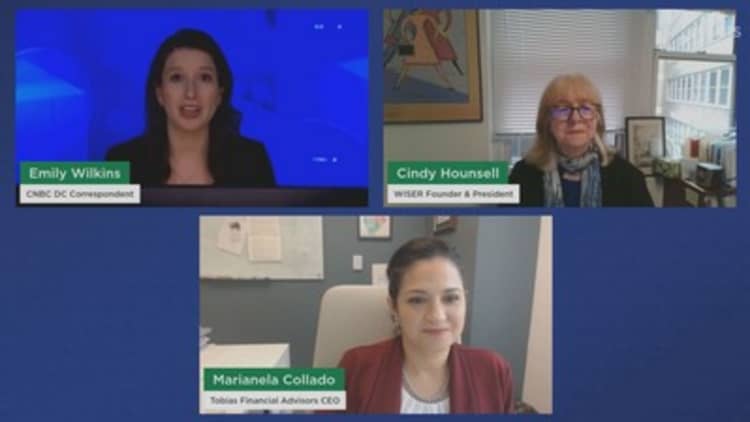Women face tough financial prospects in retirement.
About 50% of women ages 55 to 66 have no personal retirement savings, a higher share than men (47%), according to U.S. Census Bureau data. Those who do have retirement savings are less likely to have $100,000 or more (22% vs. 30%).
"The picture is pretty bleak for women" who don't save enough for retirement, Cindy Hounsell, founder and president of the Women's Institute for a Secure Retirement, said Tuesday at CNBC's Women & Wealth event.
Women's retirement savings challenges
The typical woman earns a lower salary than men: about 82 cents for every dollar, according to the Pew Research Center. That gender wage gap, which has hardly improved in two decades, makes it harder to save for the future.
Meanwhile, women must stretch their savings further. A female retiring at age 65 will likely live another 21 years, nearly three years longer than men, according to the Employee Benefits Security Administration.
A retirement savings shortfall may mean women must cut back on the lifestyle to which they were accustomed to during their working years, said Marianela Collado, a certified financial planner and CEO of Tobias Financial Advisors, based in Plantation, Florida.

They may become burdens on their children if they have kids who can offer financial support, she said at the Women & Wealth event.
Compounding the problem: Caregiving, especially for a spouse, has a "more detrimental economic impact" on women, according to the National Institute on Retirement Security. The same can be said for divorce, it found.
Advice to get on track for retirement
However, there are ways women can try to bolster their nest egg.
At a high level, they can improve their cash flows by increasing money coming in (i.e., income) and decreasing what goes out (i.e., spending), Collado said.
For example, if women think they're underpaid, they can sit down with their managers at work, inquire about opportunities for growth and find avenues for higher earning potential, Collado said. Show managers where you add value and try to get fair compensation, she added.
That may be easier to do in certain states due to growth in pay transparency laws, which require that employers disclose a salary range for job listings.
Additionally, women can do a personal spending audit on an annual basis and cut budget items that don't add long-term value, Collado said. Scrutinize spending that's on "autopilot," such as automatic charges, she said.
Women should also examine their workplace benefits to determine which are applicable, Collado said.
For example, don't leave free money on the table by not getting a company's full 401(k) match, she said. The self-employed can also set up their own 401(k) plan. Those without any access to a workplace retirement plan can save in individual retirement accounts or other types of savings accounts, she said.






